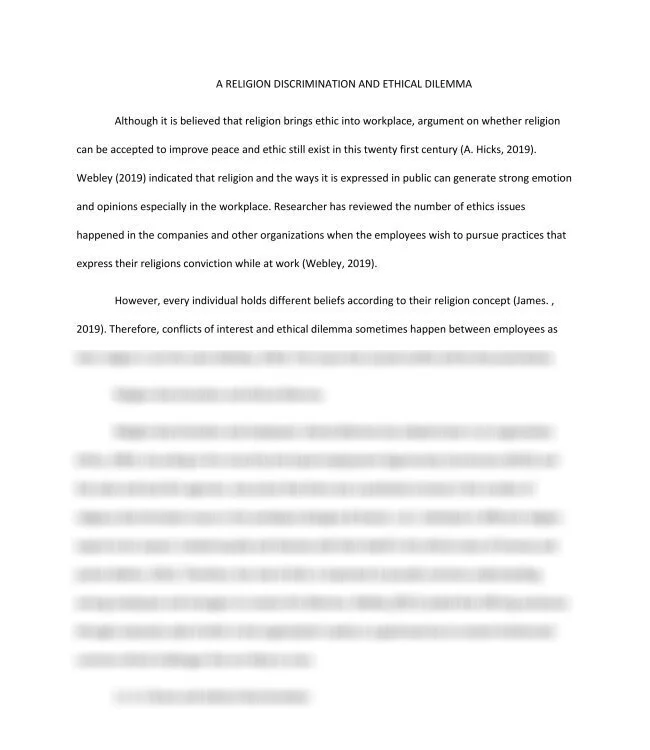A RELIGION DISCRIMINATION AND ETHICAL DILEMMA Although it is believed that religion brings ethic into workplace, argument on whether religion can be accepted to improve peace and ethic still exist in
A RELIGION DISCRIMINATION AND ETHICAL DILEMMA Although it is believed that religion brings ethic into workplace, argument on whether religion can be accepted to improve peace and ethic still exist in
& (1991) (2005) (2005), (2011) (2012) (2019) (A. (Acas, (Admin, (Beugelsdijk (EEOC) (Garcetti, (Gregory (Gundolf (Helble, (Hicks, (James. (Koshul (Pace, (Patrick (Rodgers, (Steffy, (Tan (Tjaya, (Webley, (William, (n.d) , 1.1.1.1 1.1.1.2 1991). 2003). 2005). 2006). 2009 2009). 2011). 2012). 2013). 2013; 2019). A AND Above According Additionally, Although Aryan As At Based Besides, British Buddhist Buddhists China Christianity Christians College, Commission Conclusion, Consequently, DILEMMA DISCRIMINATION Daniel, Direct Discrimination ETHICAL Economic Equal Europe, Filser, For Furthermore, Futhermore, Google, Harassment Helble Hicks, Hindu However, In Indeed, India India. Indian Indirect Individual International Islam Issue It Lam Lam, Microsoft Moreover, Muslim Muslim-majority Nevertheless, Nonetheless, Opportunity Otherwise, Pace Political Qur’an RELIGION Religion Religions Religious Researcher Rodgers Rodgers, Shika. Sikh Smulders, Some States Tan, The There Therefore, These They This United Victimisation Webley William Yahoo. a about above, accepted according activity activity. adherents. adverse affect affected affecting affects agencies, aim all allowed also always among an and any appeal applicant are argument arise. arisen as assistance at attitude attitudes attitudes. based basis be because become becomes been behaviour behaviours being belief beliefs believe believed below. benefits beside between beyond, both boycotted brings bullying business business, but by can castes categories caused cautioned century certain certainly challenges churchgoers circumstances citizen. citizens clients code come commercial common companies compare compassion, compensatory competences, complaint complete complex concept concerns condition conduct conducted conflict conflicts connection conservative considered consumption contact context contrast, controlling conviction corporate correlated costs could countries creating crime criteria critical critique cross-country culture culture. data decide decision decision. degree denied describe desires detrimentally. developed different dilemma dilemma. dilemmas direct directly disadvantage disadvantaging discrimination discrimination, discrimination. discussed dismiss dissatisfaction distressing. divided doctrines doctrines. dress each easily economic economics effect effects elect electorates emotion empathetic employee employees employees’ employee’s employment enhance environment episcopal equality equally equanimity. especially ethic ethical ethical, ethics ethics. every example, exercise exist exists expect explained express expressed face faced factors fair favourable felt find first five follow for forms fouA found founded four free from fuelled furthermost general generate giving good growth had happen happened happens happiness harassment hard has have he health, help him. his history, holds honesty human idea immigrant important important. improve improvement in include includes increase indeed indicated indirect indirectly individual industry, influence influenced influences insidious instance, intentional interactions, interest interest. international interview into investment involve is issue issues it its job jokes joy justice justified justify kindness, knowledge, labour labour. lead least legislation, legislative legitimate level like likely limited link listed local love-hate loving low-status made majority. make making management managements managers many market market, materialistic materialistically. may men met monarchical moral morals more most much multiplicity n.d). n.d.). necessity, need negative neither nor not number obvious occurs of offensive offering offers on one only opinions opposition or organization organization. organizations organization’s other others out over own ownership partner. partners. passed patriarchal peace people perceive perceptive, person’s playing pleasure. policies, policy political politics ponytails. positively poverty, powerfully practice practices prefer preferences prejudiced principle principles prohibition promotion promotion, proportionate protecting protectionism. protectionist prove proven provide provides provisions public public. punished pursue r radical range reason. reasonable recognizes record recruit redistribution reduce refuse regard related relationship religion religion, religion. religions religiosity religious reprimanded requirement research reserve resolve respect, responsible reviewed rhyme right rights, role rules sacred same satisfaction satisfying saving scheduled seats security, selected selective self-desired serves services set sexual shaping shared sharing should show shown. significant similar six skill social socializing, societies. some sometimes standards standpoint state stated still stressful strong study study, subtle such survey survey, tame tanning teased teasing, tend term. terms texts that the their them them, there these they this three through time, to tolerable tolerate top toward towards trade trade, trade-off trade. trading trading. training transaction treated trust twenty two unacceptable understanding unfair unfairly unintentional unlawful unrespecting. upsetting use used value values very victim victim. victimisation victimisation. viewed violent voice wants was wasting way ways wealth, wealth. wear welfare well. were when where whereby whether which while who whom wide will wish with without words, work work, working workplace workplace, workplace. world would “ownership” “troublemakers”
A RELIGION DISCRIMINATION AND ETHICAL DILEMMA
Although it is believed that religion brings ethic into workplace, argument on whether religion can be accepted to improve peace and ethic still exist in this twenty first century (A. Hicks, 2019). Webley (2019) indicated that religion and the ways it is expressed in public can generate strong emotion and opinions especially in the workplace. Researcher has reviewed the number of ethics issues happened in the companies and other organizations when the employees wish to pursue practices that express their religions conviction while at work (Webley, 2019).
However, every individual holds different beliefs according to their religion concept (James. , 2019). Therefore, conflicts of interest and ethical dilemma sometimes happen between employees as their religion is not the same (Webley, 2019). The issues that caused conflict will be discussed below.
Religion discrimination and ethical dilemma
